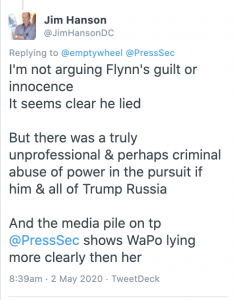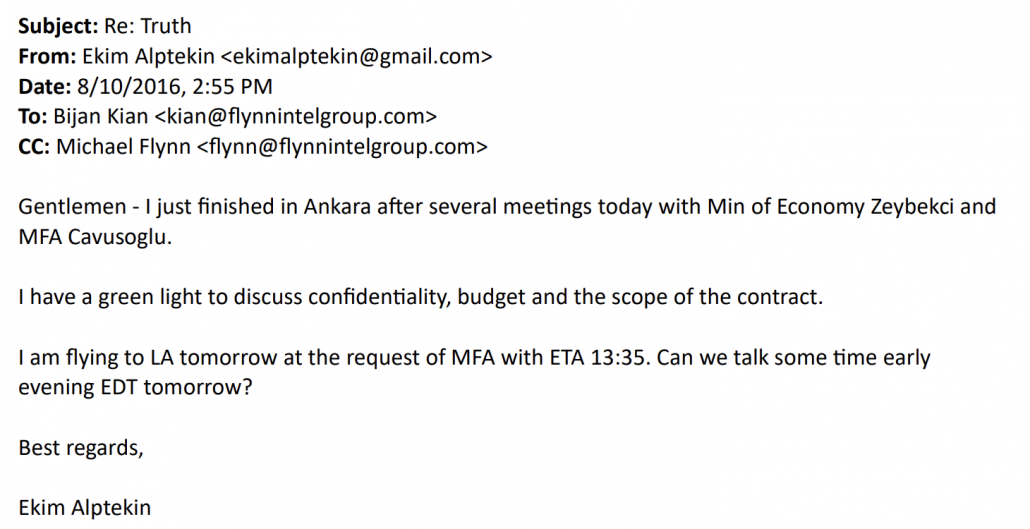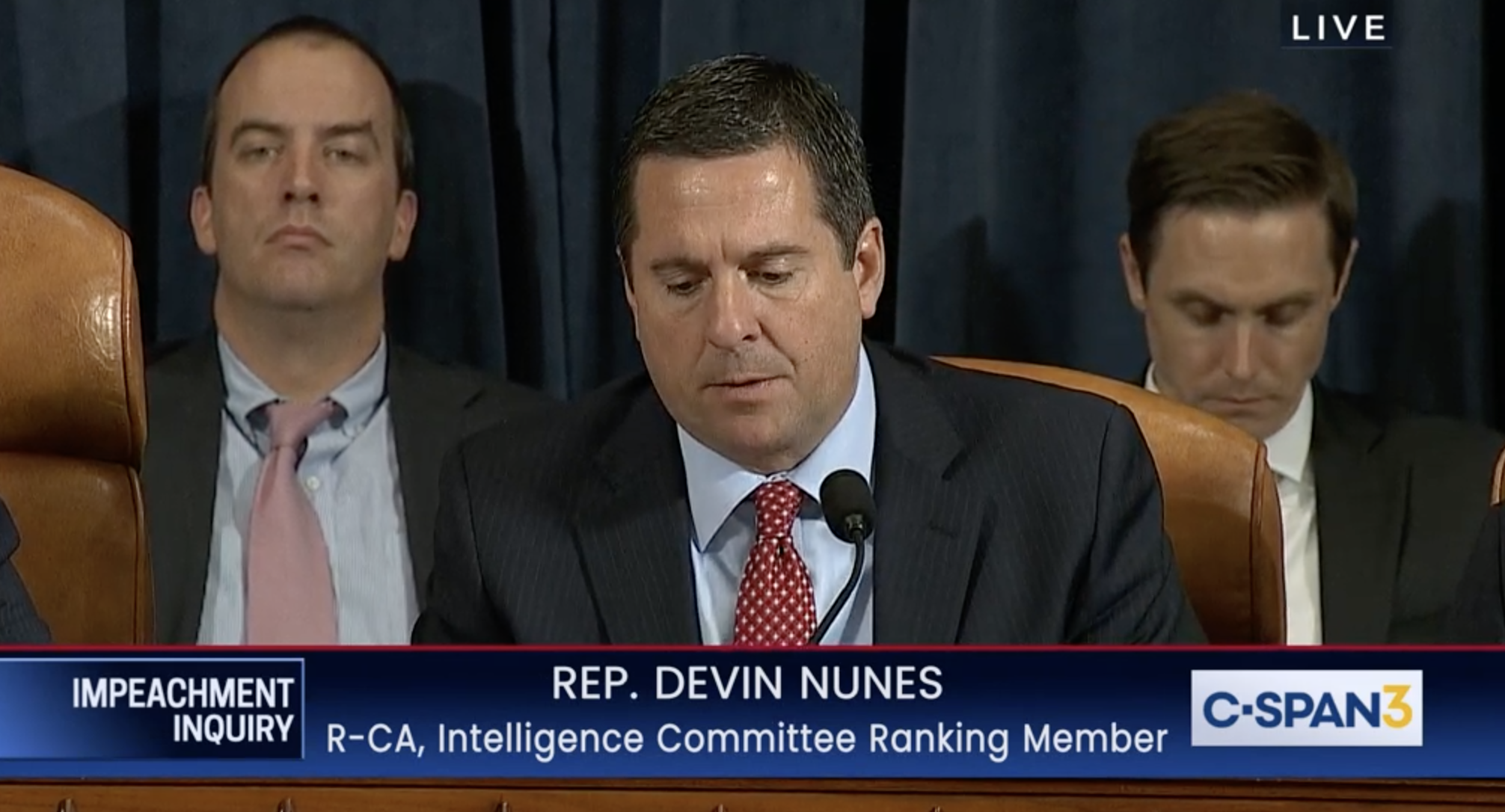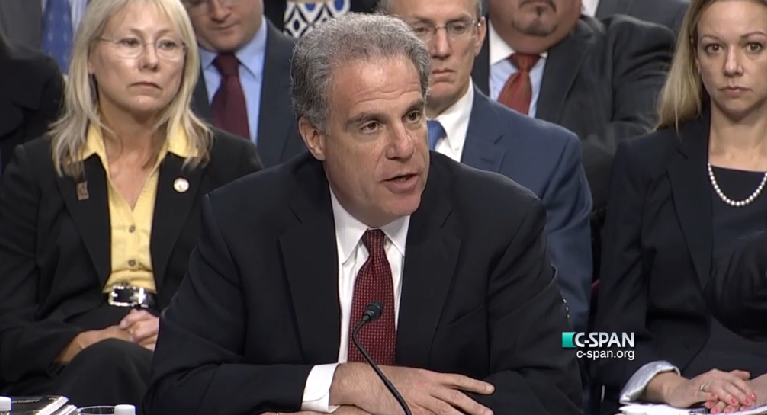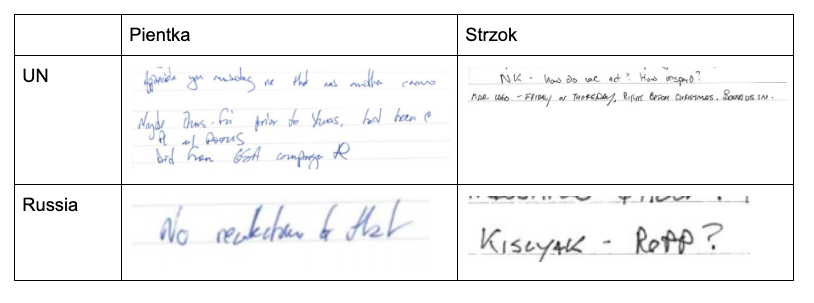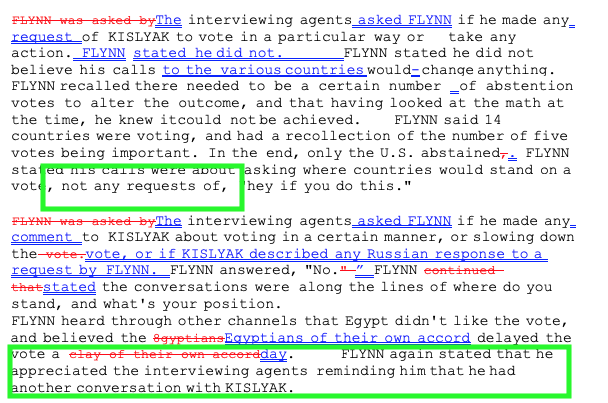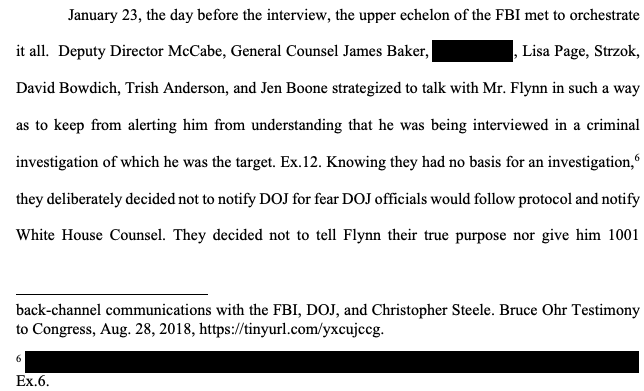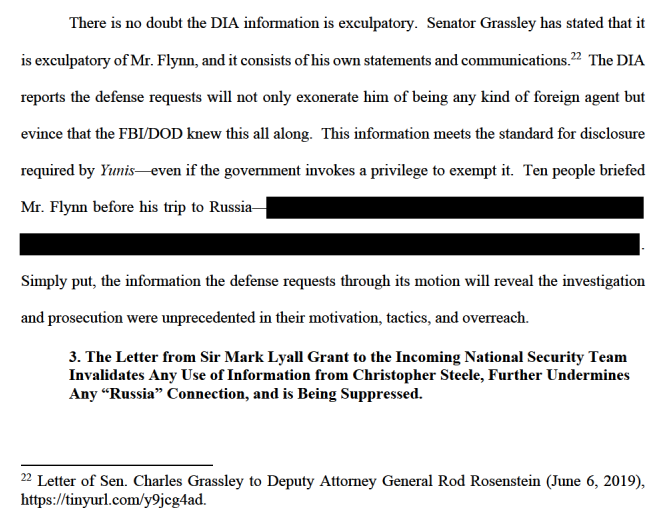As part of my deep dive into the DOJ IG Report on the Carter Page FISA, I’ve tried to capture the key events in it, which are discussed in iterative fashion in the report so hard to understand. Note, too, that the much-touted 17 problems with the renewal applications include details that only were problematic on the last application; that doesn’t excuse the errors but it obscures what FBI might have done when.
2004-2007: Carter Page lives in Russia
2007: Bruce Ohr first meets Christopher Steele
2007: Carter Page’s ties with Intelligence Officer 1 begin
April 2008: Carter Page first meets with CIA
June 18, 2009: FBI interviews Carter Page about contact with Intelligence Officer 1, who says he has been in contact with CIA
Spring 2010: Michael Gaeta first meets Steele
Summer 2010: Steele introduces Gaeta to source who provides information on corruption in FIFA, leading to opening of that investigation
October 2010: Page tells CIA he met with Intelligence Officer 1 four times and was asked about another American
July 2011: Steele provides details of alleged conversation between Medvedev and Russian oligarch who bribed FIFA
July 2011: Page meets with CIA
2012: Steele introduces FBI to two British officials with information on FIFA
2013: Intelligence Officer 1 hands off Page to Victor Podobnyy
June 2013: FBI interviews Page about Podobnyy; Page says his acquaintance with Podobnyy was positive for him; Page says he hadn’t spoken with CIA in “about a year or so” (it was July 2011); Page never informed CIA of his contacts with another Intelligence Officer (probably Podobnyy)
August 2013: FBI interviews Page about Podobnyy, who admits he has met with Podobnyy since their last interview
October 2013: Steele provides information on 3 Russian oligarchs, including one of FBI’s most wanted fugitives
October 30, 2013: Gaeta opens him as a CHS
June 2015: Steele report quotes Kremlin official admitting to bribing FIFA
August 2015: Buryakov, Prodobnyy, and others indicted
September 2015: Fusion GPS starts working for Paul Singer
September 2015: Bruce Ohr and an FBI Agent meet with Deripaska
October 2015: Nellie Ohr begins to work for Fusion
January 2016: FBI opens money laundering investigation into Paul Manafort; Page joins Trump campaign as volunteer
January 25, 2016: Steele bills FBI for 7 meetings in prior year
March 2, 2016: FBI interviews Page in preparation for Victor Podonyy trial and learns he informed a Russian Minister and others at the UN he was identified in the indictment in “the spirit of openness”
March 21, 2016: Trump formally names Page a foreign policy advisor
April 1, 2016: Counterespionage Section advises NYFO to open an investigation on Page
April 6, 2016: NYFO opens investigation into Page (note, one reference to this says the investigation was opened on April 4)
May 2016: Simpson meets with Steele at a European airport and first discusses Trump project
May 16, 2016: Page requests permission from campaign to make trip to Russia
July 5, 2016: Midyear Exam closed; Steele meets with Gaeta and hands over Report 80
July 7 & 8, 2016: Page in Moscow
July 11 or 12, 2016: Page first meets Stefan Halper at a conference in London, though DOJ IG says that was not part of an FBI tasking
Around July 12, 2016: Steele follows up with Gaeta, who has not yet done anything with first report
July 13, 2016: Gaeta shares details from Report 80 with NYFO ASAC
July 19, 2016: Steele sends Gaeta Report 94
July 26, 2016: Australia shares info with “State” in in-person meeting
July 27, 2016: “State” passes on Australian tip to Legat in UK
July 28, 2016: Legat sends tip to Philadelphia Field Office, which passed it on to Cyber CI section at FBI HQ; Gaeta sends Reports 80 and 94 to NYFO
July 29, 2016: At meeting between Comey and McCabe where the Australian tip was discussed, both Carter Page and Manafort were mentioned
July 30, 2016: Both Ohrs meet with Steele
July 31, 2016: FBI opens Crossfire Hurricane
August 1, 2016: Peter Strzok and SSA 1 travel to London to interview Australian officials
August 3, 2016: NYFO discusses Steele Reports 80 and 94; Ohr reaches out to Gaeta
Early August, 2016: Former CHS describes investigative firm being hired by DNC and another individual to explore Trump’s longstanding ties to Russian entities; information gets shared with CH team
August 4, 2016: Gaeta sends NYFO Associate Division Counsel Reports 80 and 94; tells Ohr that’s what happened; Ohr reaches out to Bruce Swartz
August 10, 2016: FBI has a team for CH, opens case on Carter Page, George Papadopoulos, and Paul Manafort
August 11, 2016: CH team meets with Stefan Halper to talk possible Russian interference in the election (Papadopoulos was the first ask, then Halper brought up Page)
August 12, 2016: FBI pays Steele his last payment, for information provided to Cyber and CI Divisions unrelated to 2016 elections; CH team meets with Halper for general briefing about how campaigns work
August 15, 2016: FBI first considers FISA on Page
August 16, 2016: FBI opens case on Mike Flynn; OGC contacts Stu Evans about FISA
August 17, 2016: FBI receives information from CIA saying he had been approved as an operational contact for CIA from 2008 to 2013; SSA 1 attends Trump’s security briefing at which Flynn attended, reporting out an Electronic Communication on the briefing
August 20, 2016: Halper meets with Carter Page; Page denies ever having met Manafort, but talks about an October surprise where 33,000 emails may get dropped; SSA 1 documents August 17 briefing in an EC
August 22, 2016: OI tells Page case agent they’re not there yet for a FISA; Simpson contacts Ohr, provides names of three intermediaries; Ohr passes it on to Gaeta
August 25, 2016: McCabe instructs SSA 1 to contact NYFO for information related to the investigation
September 1, 2016: Stefan Halper meets Sam Clovis, gets a referral to Papadopoulos
September 2, 2016: SSA 1 trying to set up subfile for Gaeta to upload Steele reports
September 7, 2016: FBI briefing at White House on ongoing Russian interference operations
September 12, 2016: Ohr and Gaeta discuss Steele again
September 13, 2016: SSA 1 realizes email setting up subfile for Gaeta didn’t work
Setpember 15, 2016: Papadopoulos meets with Halper (and “Azra Turk”); issues denial of Russian related issues that CH deems to be a cover story
September 19, 2016: Gaetta sends Reports 80, 94, 95, 100, 101, and 102 to SSA 1
September 21, 2016: CH decides to apply for FISA for Page; Steele arrives in DC
September 22, 2016: FBI submits FISA request form and OI assigns line attorney to work with CH
September 23, 2016: Isikoff Yahoo story based on Steele; Case Agent 1 emails Gaeta to ask about Steele who provided a different description than the one used in the FISA application; Steele meets with Ohr where he pitches Deripaska
September 24, 2016: Nellie Ohr’s last day at Fusion; Carter Page “fired” from the campaign
September 27, 2016: Video conference call with Gaeta aiming to meet with Steele
September 28, 2016: OI asks if Page’s public claims to have provided information to CIA were true
September 29, 2016: OI asks whether it is true that Page had provided information to CIA
September 30, 2016: FBI submits expedited FISA application for Page (and also a request for a FISA targeting Papadopoulos); OI asks how subsources can be reliable
October 2016: Car runs over Page phone, destroys it
Early October 2016: CH team meets with Steele; he describes source believed to be Millian as a “boaster”
Early October 2016: CH assess Sergei Millian is Steele source, learns he is the subject of a counterintelligence investigation; learns he had “sustained” contact with Papadopoulos since at least August 2016
October 4, 2016: Possible date Papadopoulos left campaign
October 5 and 6, 2016: First draft of Page FISA application shared with OI and NSD management
October 6 or 7, 2016: FBI GC Jim Baker reviews application
October 7, 2016: Evans asks about Steele affiliation with any campaign
October 10, 2016: Case agent 1 provides only partly responsive answer to Evans on campaign affiliation; Papadopoulos sends text saying he was “no longer with the campaign”
October 11, 2016: Evans learns Steele was political opposition research; Steele meets with Winer and Kathleen Kavalec
October 12, 2016: Strozk and others brief Comey and McCabe abt Evans’ concerns
October 13, 2016: Kavalec emails FBI CD Section Chief Winger information about Alfa Bank and Trump; TOC-East tells Ohr CI agents have met with Gaeta
October 14, 2016: FBI changes Page FISA application to say Steele was not source for Isikoff story; Case Agent 2 writes CH informing them that Gaeta did not think Steele knew who was paying for his work; draft sent to Mary McCord for her review
October 17, 2016: McCord becomes Acting AAG for NSD; meeting with Halper where Page describes being given an “open checkbook” by Russian to open a think tank and maybe appearing on media to talk about Syria, but denies knowing Divyekin or meeting with Sechin, knowing about WikiLeaks role in hacked email release, or having any role in the change of platform; Papadopoulos sends text claiming he’s still with the campaign but only “laying low”
October 18, 2016: Taushina Gauhar and OI lawyer review application; McCord asks about Fusion’s payment and prudential question; urgent Steele call about sanctions on Rusal (IG Report says US, but it seems Ukrainian?); Ohr meets with McCabe and Lisa Page
October 19, 2016: Steele gives Gaeta Jonthan Winer dossier sourced to a friend (Blumenthal) who obtained it from a Turkish businessman with ties to Russia (including that FSB funneled payments through Azeri family, probably the Agalarovs); McCabe and Evans discuss the prudential question of targeting Page; OI signs out the application; Steele and Ohr talk
October 20, 2016: FISC legal advisor reviews the application; FBI conducts the Woods review; Comey signs the application
Third week of October, 2016: First meeting between CHS 3 and Papadopoulos where he raised Millian, said he was still “indirectly” with the campaign, and planned to travel to Russia the next summer
October 21, 2016: Yates First Carter Page FISA application submitted to FISC
End of October, 2016: Second meeting between CHS 3 and Papadopoulos, Papadopoulos lays out outlines of Mifsud ties, including someone “well connected to the Russian government” and Putin’s niece” and “the Ambassador in London;” also repeats his email denials to Halper saying he believed he’d tell the CIA
October 31, 2016: MoJo story based on Steele
November 1, 2016: Gaeta first learns of MoJo story, calls and (in his last contact with Steele ever) confirms he spoke with David Corn for the story; warns Ohr about Steele
November 2016: Strzok and Priestap travel abroad to validate Steele, learn he has judgment issues
November 2016: SSA 1 requests Validation Review
November 6, 2016: CH receives Steele
Around November 8, 2016: Gaeta and Ohr meet in DC, where they discuss closing Steele; Ohr tells Gaeta that Nellie had worked at Fusion
November 14, 2016: Page submits application to Transition Team
November 16, 2016: Ohr meets with Bruce Swartz and Zainab Ahmad about Manafort investigation
November 17, 2016: Gaeta closes Steele as a source
November 18, 2016: FBI Liaison to State Department claims he first learned of Kavalec’s meeting with Steele
November 21, 2016: Ohr meets with State about Russian interference, where he and Kavalec discuss Steele, then later Strzok and others interview Bruce Ohr
November 29, 2016: In meeting on reauthorizing Page FISA, FBI still maintains Steele was not behind Yahoo News story
November 30, 2016: FBI memorandum explains that JD Gordan ensured the Ukraine platform did not change
December 2016: First reorganization of CH team
December 5, 2016: SSA 1 interviews Ohr, who provides Nellie Ohr’s Manafort timeline and provides more details about Steele’s outreach to the press
December 7, 2016: Ohr convenes a meeting on Deripaska, after which he discusses why the US would support working with Deripaska
December 8, 2016: Page in Moscow, claiming he is authorized to talk on behalf of Trump, including on Ukraine, per Konstantin Kilimnik [probably foldered] email to Manafort; Ohr calls Simpson to set up a meeting
December 9, 2016: McCain gives Comey set of Steele reports
December 10, 2016: Ohr receives thumb drive from Simpson, including Secretary of State report, reiterates focus on Sergei Millian
December 11, 2016: Simpson forwards article on Torshin and NRA, probably tells Ohr Steele spoke with Isikoff
December 12, 2016: SSA 1 interviews Ohr, obtains Ohr set of Steele reports
December 15, 2016: Ohr meets with Swartz, Strzok, and Lisa Page to bring a national security focus to Manafort’s money laundering investigation; Halper meets with Page, who describes declining invitations because of FBI investigation
December 16, 2016: McCabe fighting to include Steele information in ICA
December 19, 2016: Case Agent interviews Jim Baker about interactions with David Corn; Baker said Corn said Steele was passing information around town
December 20, 2016: Ohr gives SSA1 Nellie Ohr’s other Fusion work, which she has stripped of its Fusion headers
December 28, 2016: McCabe argues for putting Steele dossier in appendix; draft Page FISA renewal done
December 29, 2016: OI Attorney provides draft to Evans
December 30, 2016: OI Attorney provides read copy to Gauhar
January 3, 2017: Evans provides read copy to McCord
January 4, 2017: ODAG provides suggestions, believing the FISA yielded “relevant and useful information”
January 5, 2017: Clapper, Mike Rogers, John Brennan, and Comey brief ICA to Obama
January 6, 2017: Trump briefed on ICA, including dossier
January 10, 2017: BuzzFeed publishes Steele dossier; FISC says he’ll approve order
January 11, 2017: Clapper releases statement stating they had not made any judgment on reliability
January 12, 2017: Second Carter Page FISA application submitted to FISC, approved by Michael Mosman
January 25, 2017: Final meeting between Halper and Page; Page denies allegations in Steele dossier, tells of upcoming meeting with Steve Bannon
January 30, 2017: Dana Boente becomes AAG
January 2017 (shortly after 2nd Page FISA approved): FBI conducts an interview with Steele’s subsource
Early February 2017: Steele validation review resumes
February 2017: Supervisory Intel Analyst circulates a memo on interview with primary subsource
February 1, 2017: Ohr meets with Swartz, Ahmad, Weissman, Strzok, Lisa Page, and another FBI person about bringing financial analysts into Manafort investigation
February 9, 2017: Boente becomes Acting DAG
February 16, 2017: ODAG briefing reflects the Ohr’s ties with Steele and Fusion
March 2017: FBI conducts a second interview with Steele’s sub-source
March 2017: Supervisory Intel Analyst reviews original application for declassification
March 6, 2017: Notes from Boente briefing reflect Ohr’s efforts to re-energize Manafort case
March 10, 2017: Page interview with FBI
March 16, 2017: Page interview with FBI
March 20, 2017: Case agent provides additions to OI to being reauthorization process; FBI memo on JD Gordan
March 22, 2017: Notes from Boente meeting reflect knowledge of Weissmann, Swartz, and Ohr interest in Manafort case
March 23, 2017: Steele validation review completed, found him suitable for continued operation; case agent provided summary of subsource interview from January to OI
March 29, 2017: OI sent OGC draft of reauthorization
March 30, 2017: Page interview with FBI; OI sends draft to managers
March 31, 2017: Page interview with FBI; Boente becomes Acting AG overseeing CH
April 2017: NYFO obtains Page’s financial records
April 2017: Second reorganization of CH team
April 2, 2017: Gauhar gives draft application to Boente and Crowell
April 3, 2017: Boente approves application; Evans mails McCord application; in court filing, Steele admits he gave off-the-record briefings
April 5, 2017: Comey certifies
April 6, 2017: FISC pre-approves
April 7, 2017: Third Carter Page FISA application submitted to FISC; Anne Conway approves it
April 26, 2017: Rod Rosenstein confirmed DAG; Strozk circulates Steele admission among Intel personnel
May 2017: FBI conducts a third interview with Steele’s subsource, subsource says he or she has found zero corroboration for election reporting
May 1, 2017: In court filing Steele admits speaking to the press
May 17, 2017: CH transferred to Mueller
June 7, 2017: FBI interview with Platform Committee member confirms JD Gordon prevented the platform change
June 15, 2017L OGC emails liaison with CIA for clarity about Carter Page
June 16, 2017: First draft of renewal
June 19, 2017: Clinesmith sends an altered email to SSA 2
June 20, 2017: FBI first shares details of August 2016 Page denials (to Halper)
June 21, 2017: OI finishes draft
June 23, 2017: Read copy to FISC and ODAG
June 28, 2017: McCabe signs application
June 29, 2017: Fourth Carter Page FISA application submitted to FISC; Raymond Dearie approves
September 2017: Mueller’s team interviews Steele
September 22, 2017: Last day of FISA coverage on Carter Page
October 2017: The Ohrs informed Congress provided documents reflecting Nellie Ohr’s work at Fusion
November 28, 2017: SSCI asks for a briefing with Bruce Ohr
December 5, 2017: Crowell and Schools meet with Ohr about his 302s
December 6, 2017:: Crowell and Schools demote Ohr
December 20, 2017: Schools removes him as Director of OCDETF to avoid any coordination with the White House
January 4, 2018: Chuck Grassley and Lindsey Graham write the department about interviews of Ohr
March 28, 2018: OIG announces investigation
May 2018: OIG expands to include assessing whether FBI infiltrated Trump campaign; NSD learns of Papadopoulos’s September 2016 denials
July 12, 2018: NSD submits correction to FISC
October 25, 2018: George Papadopoulos testimony
January 31, 2019: Evans tells OIG he told Collyer they’d wait on the IG Report for further notice
May 10, 2019: NSD alerts FISC to two minimization violations
December 9, 2019: Release of the Report
December 17, 2019: Rosemary Collyer letter responding to report


